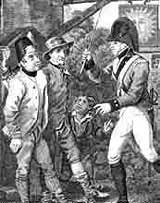
Military ranks are a system of hierarchical relationships, within an armed forces, police, intelligence agencies or other institutions organized along military lines. The military rank system defines dominance, authority, and responsibility in a military hierarchy. It incorporates the principles of exercising power and authority into the military chain of command – the succession of commanders superior to subordinates through which command is exercised. The military chain of command constructs an important component for organized collective action.
Regimental sergeant major (RSM) is an appointment that may be held by warrant officers class 1 (WO1) in the British Army, the British Royal Marines and in the armies of many Commonwealth and former Commonwealth nations, including Australia, Kenya and New Zealand. It is also an appointment that may be held by chief warrant officers (CWO) in the Canadian Forces and warrant officers of any grade in the Singapore Armed Forces, and is a rank in itself in the Irish Defence Forces and formerly in the British Army, Royal Marines and United States Army. Only one warrant officer holds the appointment of RSM in a regiment or battalion, making him the senior warrant officer; in a unit with more than one WO1, the RSM is considered to be "first amongst equals". The RSM is primarily responsible for assisting their commander for maintaining standards and discipline amongst the non-commissioned members and acts as a parental figure to their subordinates.

A non-commissioned officer (NCO) is a military officer who has not pursued a commission. Non-commissioned officers usually earn their position of authority by promotion through the enlisted ranks. In contrast, commissioned officers usually enter directly from a military academy, officer candidate school (OCS), or officer training school (OTS) after receiving a post-secondary degree.

The Gurkhas or Gorkhas, with endonym Gorkhali, are soldiers native to South Asia, chiefly residing within Nepal and northeastern India.

Sergeant is a rank in many uniformed organizations, principally military and policing forces. The alternative spelling, serjeant, is used in The Rifles and other units that draw their heritage from the British light infantry. Its origin is the Latin serviens, 'one who serves', through the French term sergeant.
Corporal is a military rank in use in some form by many militaries and by some police forces or other uniformed organizations. Within NATO, each member nation's corresponding military rank of corporal is combined under the NATO-standard rank scale code OR-3 or OR-4. However, there are often differences in how each nation employs corporals. Some militaries do not have corporals, but may instead have a junior sergeant.

The Ulster Defence Regiment (UDR) was an infantry regiment of the British Army established in 1970, with a comparatively short existence ending in 1992. Raised through public appeal, newspaper and television advertisements, their official role was the "defence of life or property in Northern Ireland against armed attack or sabotage" but unlike troops from Great Britain they were never used for "crowd control or riot duties in cities". At the time the UDR was the largest infantry regiment in the British Army, formed with seven battalions plus another four added within two years.

Soldier Soldier is a British television drama series. The title comes from a traditional song of the same name - "Soldier, soldier won't you marry me, with your musket, fife and drum?" - an instrumental version of which was used as its theme music.

Operation Barras was a British Army operation that took place in Sierra Leone on 10 September 2000, during the late stages of the nation's civil war. The operation aimed to release five British soldiers of the Royal Irish Regiment and their Sierra Leone Army (SLA) liaison officer, who were being held by a militia group known as the "West Side Boys". The soldiers were part of a patrol that was returning from a visit to Jordanian peacekeepers attached to the United Nations Mission in Sierra Leone (UNAMSIL) at Masiaka on 25 August 2000 when they turned off the main road and down a track towards the village of Magbeni. There the patrol of twelve men was overwhelmed by a large number of heavily armed rebels, taken prisoner, and transported to Gberi Bana on the opposite side of Rokel Creek.

The British Army came into being with the unification of the Kingdoms of England and Scotland into the Kingdom of Great Britain in 1707. The new British Army incorporated Regiments that had already existed in England and Scotland. The Army has traditionally relied on volunteer recruits, the only exceptions to this being during the latter part of the First World War until 1919, and then again during the Second World War when conscription was brought in during the war and stayed until 1960.

The Israel Defense Forces (IDF) have a unique rank structure. Because the IDF is an integrated force, ranks are the same in all services The ranks are derived from those in the paramilitary Haganah, which operated during the Mandate period in order to protect the Yishuv. This is reflected in the slightly compacted rank structure: for instance, the Chief of Staff is seemingly only equivalent to a lieutenant general in other militaries.
"Arthur McBride" is an Irish folk song found in Ireland, USA & Britain with slight variations. The song can be narrowly categorized as an "anti-recruiting" song, a specific form of anti-war song, and more broadly as a protest song.

The King's shilling, sometimes called the Queen's shilling when the Sovereign is female, is a historical slang term referring to the earnest payment of one shilling given to recruits to the Armed forces of the United Kingdom in the 18th and 19th centuries, although the practice dates back to the end of the English Civil War. To "take the King's shilling" was to agree to serve as a sailor or soldier in the Royal Navy or the British Army. It is closely related to the act of impressment. The practice officially stopped in 1879, although the term is still used informally and there are some cases of it being used still in the early 20th century, albeit largely symbolically.
Quartermaster sergeant (QMS) is a class of rank or appointment in some armed forces, especially those of the United Kingdom and the Commonwealth, and formerly also in the United States.
A war song is a musical composition that relates to war, or a society's attitudes towards war. They may be pro-war, anti-war, or simply a description of everyday life during war times.

The Irish Army or Irish establishment, in practice called the monarch's "army in Ireland" or "army of Ireland", was the standing army of the Kingdom of Ireland, a client state of England and then of Great Britain. It existed from the early 1660s until merged into the British Army in 1801, and for much of the period was the largest force available to the king, being substantially larger than the English and Scottish establishments.
Social background of officers and other ranks in the British Army, 1750–1815 discusses career paths and social stratification in the British Army from the mid-eighteenth century to the end of the Napoleonic wars. The British army of the period was mainly recruited through volunteer enlistment. Most recruits were young men from the lowest social classes who could not find a livelihood on the civilian labour market. The non-commissioned officers were promoted soldiers sharing the social background of the rank and file. Literacy was a basic requirement for promotion to non-commissioned rank; writing and basic mathematical skills were compulsory for ranks above corporal. About ten percent of the commissioned officers were former sergeants, but the majority came from higher social strata. Aristocracy and gentry were over-represented in the higher ranks, but most officers came from a background of landowners, or were the sons of clergymen, lawyers, doctors or successful merchants. The purchase system was the mechanism through which the officer corps was structured according to social class.
The military ranks of the German Empire were the ranks used by the military of the German Empire. It inherited the various traditions and military ranks of its constituent states.

William Francis "Paddy" Fox BEM was a British Army recruiter and Chelsea Pensioner. He served as a radio operator in the 15th/19th The King's Royal Hussars from 1951. With a brief period as a court usher from 1956 to 1958, Fox remained in the army until 1988. In 1968 he became a recruiter, based in Horden near Peterlee in County Durham. By the end of his career he had recruited 2,000 men to his regiment, becoming the British Army's most successful recruiting sergeant.












